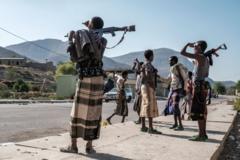The interim governing party in Ethiopia's Tigray region, the Tigray People's Liberation Front (TPLF), has voiced its deep concerns following a decision by the National Election Board of Ethiopia (NEBE) to revoke its legal status. This move directly threatens the peace agreement that concluded two years of conflict in the area, heightening fears of a resurgence of violence.
The TPLF, which has historically played a leading role in Ethiopian politics until Prime Minister Abiy Ahmed's rise in 2018, was banned for not convening a general assembly to address internal divisions. Internal rifts within the party have prevented it from holding necessary elections, providing fuel for the NEBE's decision.
Following the enforcement of the ban, the TPLF has called on the African Union to apply pressure on the federal government to reverse the decision, highlighting that it violates rights regained through the 2022 Pretoria Agreement, which aimed to foster dialogue and ensure mutual recognition.
Ammanuel Assefa, TPLF deputy chairman, emphasized that the ban not only impacts the party but threatens the very structure of peace that many have sacrificed to achieve. He warned that such actions could unravel the fragile progress made since the truce, further exacerbated by unresolved issues, including the return of over a million displaced individuals.
Fears are mounting among Tigrayans and international observers alike, as countries such as the US, UK, and EU have expressed grave concerns regarding the escalating tensions. Advocates are calling for urgent dialogue to avert a slide back into violence, emphasizing the critical need to uphold the terms of the peace agreement for the stability of the region.
While the TPLF attempts to navigate the complex landscape of Ethiopian politics, the stability of Tigray and the greater nation hangs in a precarious balance.



















